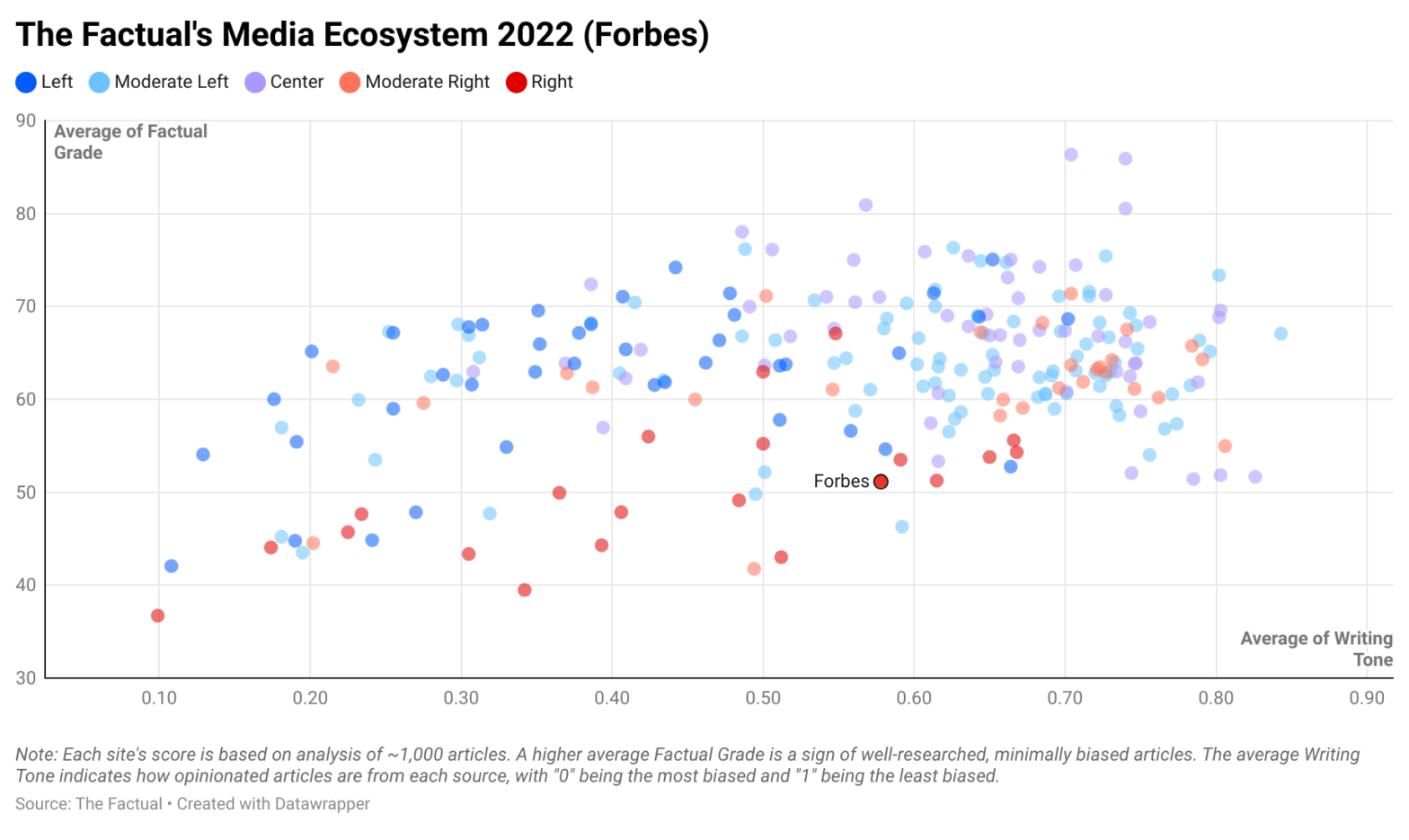Forbes is most famous for being one of the pre-eminent business-focused publications in the U.S. Its news coverage stretches beyond the business world to politics, science, and culture. However, it has been subject to criticism, both for highly variable quality and changes to its ownership. This leads to two important questions: how factual is Forbes and how biased is its news content?
How Does The Factual Rate News Sources?
The Factual analyzes more than 10,000 news stories every day to help readers find the most informative, least-biased articles. Our news-rating algorithm scores each article along four metrics: (1) cited sources and quotes, (2) publication history, (3) writing tone, and (4) author expertise. These scores combine in a weighted average we call a Factual Grade, which ranges from 0–100%. (See our How It Works page to learn more about our algorithm.)
For this study, we analyzed ~1,000 articles each from 240 news sources. The average Factual Grade for the entire dataset was 62.5%. Based on these averages, we can compare the performance of news sites across the media ecosystem. The entire dataset can be explored in greater detail here.
How Factual Is Forbes?
Forbes scored an average Factual Grade of 51.1%, placing it in the 10th percentile of our dataset. Forbes’ low scores do not have a single cause and instead seem to be the result of several factors, such as hundreds of guest authors, intermittent sourcing for some articles, overuse of internal links, and opinionated writing. Furthermore, mixed in with proper news articles are articles that are effectively advertisements for products, which score very poorly.
Like any news source, scores for articles from Forbes varied widely based on factors like author expertise and cited evidence. For example, some scored above 80%, while others scored below 50%.
Please check your email for instructions to ensure that the newsletter arrives in your inbox tomorrow.
How Opinionated Is Forbes?
One of the metrics The Factual uses is the Writing Tone, which measures how opinionated the writing is in an article. For this metric, the algorithm looks for signs of subjective commentary (e.g., first person pronouns and unnecessary adverbs), as well as the emotional nature of selected words, and sees how prevalent they are for a given length of text. More neutral text receives higher ratings, with “0” being the most opinionated and “1” being the most neutral.
Forbes had an average Writing Tone score of 0.58, placing it in the 42nd percentile in our dataset for this metric. This suggests that articles from the site tend to exhibit a moderate amount of opinion. This is evident in articles titles such as “The EU Strikes Again As A Global Leader In Mindful Media” and “Idaho Shows How Not To Fill Empty Teaching Jobs.”
How Biased Is Forbes?
The Factual classifies news sites by political bias as either Left, Moderate Left, Center, Moderate Right, or Right. This classification comes from third-party assessments from media bias organizations such as AllSides and Media Bias/Fact Check. Based on this data, The Factual assigns Forbes a Moderate Right bias.
Media Bias/Fact Check, for example, categorizes Forbes as “Right Center” due to “story selection that favors the right and the political affiliation of its ownership” and scores it as “Mostly Factual” for reporting, due to some “misleading or false stories related to climate science.” This classification is supported by community feedback, where a majority (35%) of 435 respondents rated Forbes as “Right Center.”
AllSides, another media bias organization, has not completed an in-depth editorial review of Forbes, which they typically provide for major news outlets. However, AllSides community ratings give Forbes a “Center” rating based on 22,159 votes.
Forbes has intermittently published articles that lend credence to its classification as somewhat conservative. For example, they published an article by right-wing commentator Dinesh D’Souza on 2010. The articles was “a gross piece of innuendo—a fact-twisting, error-laden piece of paranoia,” according to the Columbia Journalism Review. Several years later they published an article in which editor-in-chief Steve Forbes likened then-president Obama to Lenin.
This bias may have lessened over the last decade but remains present. During the Trump era, Media Bias/Fact Check noted the site “presents a reasonable balance through their contributors” but publishes stories “more in favor of his policies than against.” Moreover, Steve Forbes remains the editor-in-chief and continues to publish conservative articles through the platform, with titles like “How Biden’s Corporate Tax Hike Will Hurt The Middle Class.”
Who Owns Forbes?
The Hong Kong-based company Integrated Whale Media Investments purchased Forbes in 2014. Critics suspect this ownership is influencing the site’s coverage in favor of China. Since the acquisition, Forbes has fired contributors known to be hawkish on China, and editors have taken issue with “problematic” language toward China. While such bias is only relevant to some stories, it has noticeable impacts. For example, this story covering the 2018 arrest of Huawei CFO Meng Wanzhou elevates the perceived economic risks of the move rather than the reasons for the arrest.
Please check your email for instructions to ensure that the newsletter arrives in your inbox tomorrow.
How to Mitigate Bias
News articles are bound to have bias because all authors have some frame of reference within which they describe a story. Political bias ratings are helpful in understanding this framing. However, it can be more beneficial to know how factual an article is based on quantifiable metrics that can be seen across the media ecosystem, such as cited evidence, author expertise, and writing tone. This is what The Factual ascertains.
Reading several, highly rated articles from across the political spectrum helps counter the bias of any news source or story. To have the day’s most factual news stories delivered to your inbox every morning, subscribe to our daily newsletter.
Article updated on September 15, 2022 to reflect new data.

